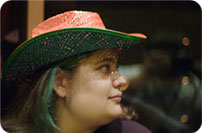The Tyranny of Lists
Another experiment. I dug up yet another scribbly half-baked essay and decided to turn it into an audio entry. I have a nice mic that I bought for this purpose and I’m learning a bit about audio production here and there (thanks Geoff!). The final result, not edited except to remove 3 “ums” (which I inserted deliberately, bizarrely enough), is a conglomeration of reading my notes and adlibbing. A cookie to anyone who can tell where the reading starts and ends (although I improvise and add to the reading in a few places as well).
You can download it here (AAC/MP4 audio format). Or just read the transcript.
I’m full of myself. I can admit it. I spend a lot of time philosophizing quietly to myself, scribbling in my notebook, you know, at night, 3 in the morning. Sometimes I’m drunk. Not usually, but sometimes.
And I’ve spent a lot of time thinking lately about how we relate to technology, and about how our pervasive use of technology changes us, changes the way we look at the world, changes the way we look at each other and ourselves. And, to be frank, it worries me.
I’ve got more than a few pages scribbled in a notebook or two on this topic, and I found one of them just now and it kinda prompted me to want to talk (to a microphone, at one in the morning, by myself). So here I am, talking to a microphone, at 1 in the morning, by myself. (Actually it’s 12:55am, but who’s counting?)
Anyway. What I wanted to talk about is something that I’ll—well, that I already titled “The Tyranny of Lists.” Let me tell you, when you’re looking through a notebook and you see a line heading up a page, a line like “The Tyranny of Lists,” it kinda piques your interest. Or at least it piques mine. And honestly, what piques my interest is what I’m concerned with here. Sorry, guys.
I think we spend a lot of our time organizing and thinking like a computer, just because we can, or because we’re used to it. But real life isn’t stateful. If real-world things can be said to have states, then they are fluid states. After all, we can’t represent a day with state diagrams. We don’t order our lives with lists, not really. That’s artificial order that we impose on messy, organic things; that’s something we learn, in order to interact with technology.
Does it change the way we interact with non-technological things as well? With our daily lives, with nature, with each other? Do we begin to think of human beings as stateful? Either this or that, and if this, then I could do x or y or z, but not a or b.
I worry that this is true. I worry that the way we reframe things to deal with technology becomes our dominant way of approaching the world, rather than another tool in our repertoire, another language we can switch to and switch out of fluidly.
Input this, wait. That didn’t work, how do I rejigger it? Hive it a moment to fix itself… or try again from the beginning? Enter data, wait; follow instructions, wait. Restart
Do we think of ourselves this way, too?
I am happy, or I am sad. And if I am sad, then I have these potential avenues. Do I work on things, or hit the reset switch? Can I be introverted and extroverted in the same body/consciousness? Can I be both liberal and conservative, or must it be one or the other? Well-meaning, but ill-doing?
I also see a tendency for people to act as if other human beings are games or problems that they can solve, if they can just find the right inputs, the right levers to press and buttons to push. That they can actually come up with the right sequence of inputs to plug into some formula, to get the person to spit out the reaction they expect, that they desire.
I’m not saying this is necessarily an evil thing, wanting to get what you want out of people, and I don’t think the people i’m describing are typically evil people, they just aren’t considering that there’s another full human being in there, in the other person they’re thinking about. They’re not sociopaths. If you talk to them, they know intellectually that there’s another person in there, I believe. I don’t think that they’re crazy, and I don’t think that they’re likely to go on and start torturing small animals and work their way up the food chain. But, at the same time, they go through life thinking that they just need to find that right sequence, the right inputs, the right thing to do, the one way, to get what they want… and that it will work.
But that’s not the way it works in reality. Humans are messy. Real life is messy. Fate is a tightly coupled system and it’s non-deterministic. There’s an illusion, sometimes, of causality, that if you had gone back and done one thing differently, you think you know how things turn out then, with that different input. But, but no. You never know how things will turn out. You can do everything according to plan, perfectly, and things still won’t turn out the way you expected, they way they should, according to plan.
You can be so sure that this, that, or the other thing that you did led up to the result you have today. But that’s also an illusion. We flatter ourselves in thinking that we understand such things, but there’s no way for a human to really comprehend how the world works. And yet because of technology, because of these tools and things we interact with every day, we begin to look at the entire world as a system that we can understand and manipulate. We think we can get the full measure of it. We think that there’s some way to approach it—those levers, buttons, inputs that will let us manipulate, let us get what we want. Turn the right dial, get the gumball. But I don’t think that’s true.
You’ll have to forgive me, because when I write about this, and think about this, I feel an overwhelming urge to quote Whitman, pretentious at it may be. Whitman is the best source to cite here, on the subject of human weirdness, contradictoriness, tightly-coupledness, and non-deterministic behavior.
From his most quotable poem, Song of Myself, the three most quotable lines (although I’ll say they’re not my favorite). Here we go:
Do I contradict myself?
Very well then I contradict myself,
(I am large, I contain multitudes.)
It may be the most hackneyed poetry quote I could insert here, but nevertheless it seems appropriate.
I think we all have to remember, a little bit more often, that we’re just these fluid-filled sacs governed by hormones and chemicals and electrical impulses, rather than something harder, something more precise, something more binary, digital. We’re the ultimate in analogy, really. If you think about it.
And it worries me that we often don’t think about ourselves this way, day to day. It worries me that this changes the way people attempt to live their lives, the way they try to construct society or change society, affect change, you know, build governments, without thinking that Input A and Input B do not equal Output C when it comes to humanity.
And my… train has just run out of steam. I have nothing else to say. That’s my point. A weak conclusion, perhaps, but that’s my conclusion.








Perfect.
Not binary, digital perfect, but human, messy, imperfect perfect.
Hi, Yes, we may increase the resolution of our digital models, to get the closer to the analogic of the real world, digital stays digital… And many people in the world should stop thinking people in terms of 0 or 1… Anyway, always happy to read you. Have a nice day 🙂 (and sorry for my bad English)
Hi Amy,
Great post. Very refreshing.
Actually thanks to this post and others like it, it might not die out and there could be a regrowing market for it.
I think you have it backwards.
The world (every one of us included), a day, a mood, is more stateful than we normally realize. The true beauty isn’t that these things have no internal state, or that what they have is all a messy, muddle but that that it’s all much more intricate and structured than we can ever come to grips with.
We aren’t just "fluid-filled sacs governed by hormones and chemicals and electrical impulses"; we’re also dozens to hundred of fluid-filled sacks (organs) arranged into a complex–no, wait, we’re really trillions of fluid-filled sacks (cells) working together in a system of enormous complexity to–oh right, we’re really quadrillions of fluid-filled sacks (organelles) partitioned into an intricate–no, wait–but you get the point. Not simple yet messy–mind bogglingly complex. The only reason it seems messy is that there is so much we don’t understand.
Also, technology didn’t cause the structured way of looking at the world; the structured way of looking at the world caused technology. Computers didn’t just appear one day and change our collective view of the world. We formed a view of the world over eons and it enabled / drove us to develop computers. Everything from accounting applications to cell phone games, blogs to porn, spam to wikipedia, is an outgrowth of who we are and how we think, and how we live our lives.
Technology is a mirror. Or perhaps a societal self portrait.
–MarkusQ
MarcusQ, your post is a good example for what Ami meant, I think. On one hand you say, that the world is too complex for us to ever understand. But on the other, you think your opposing view is the only answer. Sure you’re right to some point, but Amy is too. The world is not black or white, everything has some influence to something else. And technology can have a lot of influence on our daily behaviour, that’s for sure. Take the TV. Don’t you think the Kids a hundred years age had different childhoods? Now they’re partially raised by the TV. (commercials, news, soaps, and a lot of other stuff there)
Or take the mobile phone. Imagine a date. 10 years ago you met with someone at a fixed time, or you would miss him. Now you don’t have the obligation to come, you can always call in and make another date. And if you don’t really like the person, you just send an SMS with a quick lie, and download some anime porn. People don’t have to actually talk eye to eye, it’s a lot more unpersonal, and I think a lot more honest too. And don’t get me started on military technology. Take the Apache pilot, sitting in his helicopter staring at a screen of green dots, and then just pushing a trigger, ripping some men 2 miles away apart. Yea, life is a game, where is my god-hack? There are obviously a lot more examples, but I stop for the sake of time and my bad english.
I read a good book about how technology influenced human life, it’s called "Computer Power and Human Reason. From Judgement to Calculation" by Joseph Weizenbaum.
^^ some typos there: Of course I meant life today is a lot more DISHONEST today, because it’s a lot less personal.